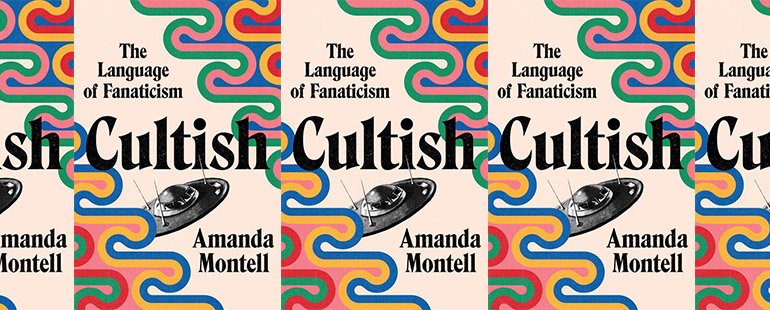Cultish’s Exploration of Manipulative Language

Humans, including writers, are as likely to trumpet the power of language as they are to bemoan its inadequacy. Italo Calvino, Italian writer and journalist, once said, “The struggle of literature is in fact a struggle to escape from the confines of language.” Amanda Montell’s recent book Cultish: The Language of Fanaticism argues that language is perhaps more powerful than even the most optimistic poet or novelist has hoped. The average person, when talking about cults, is likely to be mystified about how people ever got involved in such a group, or may vaguely think that “brainwashing” was involved. Indeed, while we might feel safer if there were more esoteric or arcane tricks being used, Montell argues that cults bewitch followers exactly the same way that poets and novelists do: with language.
Cultish is not concerned with defining which groups are or are not “cults.” The term “cult” itself has a notoriously slippery definition; as Montell explains, the word shares its Latin roots with “culture” and “cultivation,” later came to mean a sect of a religion, and is currently used to reference a group the speaker thinks is shady, as well as to describe something appealing but niche—“cult classic.” There is not, it turns out, a working academic definition or set of standards to identify a “cult.” Montell argues that what does define groups that are “cultish” (her own spin on the word) is their repeated, intentional use of certain types of language. Novelist Chinua Achebe wrote in Hopes and Impediments: Selected Essays that we must turn to the “ominous threat . . . by those who will manipulate words for their own ends.” “Brainwashing,” Montell explains—with significant expert support—isn’t real, but threats of manipulative cultish language are.
Montell argues that cultish language is used by a wide spectrum of groups, including many that most of us encounter daily. From politicians to multi-level marketing companies to Scientology to fitness groups to spiritual gurus on YouTube to CEOs of major companies, we are inundated. It behooves us, then, to become intimately familiar with this language in order to identify if it is being used in a cultish way. Cultish language, Montell says, includes the “crafty redefinition of existing words (and the definition of new ones) to powerful euphemisms, secret codes, renamings, buzzwords, chants and mantras, ‘speaking in tongues,’ forced silence, even hashtags.”
Cultish language shows up when Healthy, Happy, Holy Organization practitioners chant prayers in Gurmukhi towards a photograph of leader Yogi Bhajan and repeat phrases like “the science of the mind.” Or when Synanon followers were instructed to “act as if,” a thought-terminating cliche that means “act as if you believe,” disrupting the possibility of healthy disagreement and critical thinking. The Heaven’s Gate leader created a whole vocabulary of sci-fi evocative terms, replacing “kitchen” with “nutra-lab,” “meals” with “laboratory experiments,” “followers” with “students,” and life inside their shared house as being “in craft” (meaning, a spacecraft). These special words, use of other languages, and short repeated phrases are linguistic rituals (the repetition aspect of a ritual is critical here), that create a specific, circumscribed world of the group. Those within the group increasingly feel a special sense of belonging as they come to share the new language, and are increasingly separated from those who don’t.
It’s important to note that not all groups or leaders who use these tools are using them to negative ends. While Cultish is primarily filled with personal accounts and other documentation from notorious cults (her own father escaped from one as a teenager), Montell says that the idea for writing Cultish came after a conversation with a close friend who had recently joined Alcoholics Anonymous. The friend used so many examples of “exclusive language” during a brief exchange that all of Montell’s cultish alarms went off. In this case, AA was changing her friend’s life for the better, “But its conquest of her vocabulary was impossible to unhear.”
Part of why influential language is so effective in shaping group members’ behaviors and worldview, Montell argues, is that we are quite willing to take on new language, but once established, it’s often the last thing to go, even if someone leaves a cultish situation. Elaborating, Montell offers the example of Frank Lyford, who survived Heaven’s Gate, a group that came to its end with mass suicide in 1997. Twenty-five years after leaving Heaven’s Gate and its belief system behind, Lyford still uses the coded language Heaven’s Gate taught him, including the euphemism “leaving Earth” for the group’s mass suicide.
Jim Jones, the leader of Jonestown (which also ended in mass suicide, and homicide), studied the speech and language styles of “compelling” leaders, from Dr. Martin Luther King Jr. to Hitler. The “Death Tape” recording of Jim Jones speaking to his followers on their final day, in which he convinced them to ingest cyanide under threat of murder (armed guards were standing by), includes examples of many kinds of cultish language, like euphemisms (“free at last” for suicide), the redefinition of words (Jones took the term “revolutionary suicide” from the Black Panther Party, twisting it into something his own), and the chant or mantra-like repetition of “I don’t want to see you go through this hell no more, no more, no more, no more.” The Death Tape, Montell says, is “a poem, a curse, a mantra, a betrayal, a haunting. And proof of language’s lethal power.” The mass death that befell Jonestown was the culmination of years and years of Jones’s followers being immersed in cultish language; they were linguistically groomed for a moment such as this (in fact, Jones, who had been leading the group for more than two decades, had been stockpiling cyanide for several years). Manipulative language is powerful, but it’s the ongoing immersive repetition of it that leads to situations many of us label “cults.”
Cultish is new enough that Montell is able to touch on the cultish language of Donald Trump, QAnon, and “Antivaxxers and Plandemic truthers” to further illustrate the power of immersion in cultish language, and the speed with which we can become enchanted by it. QAnon is a powerful current example of a group whose most common, entry-level vocabulary words, such as “deep state” and “paradigm shift,” are vague. “They work to reel in and bond recruits without revealing too much,” Montell writes. “It’s not unlike how Scientology conceals the language of their bizarre upper levels so as not to lose new followers.” Anyone who becomes entrenched in a group’s cultish language becomes entrenched in the values and beliefs of that group, which are often intentionally hidden or obscured at the beginning; the alignment with new values and beliefs can alter behavior. Social media has increased the pace of this rabbit hole effect exponentially, delivering more and more information connected with one group to unwitting users and further cementing their absorption of cultish language.
Though this may make cultish situations seem scary, by the end of Cultish Montell argues that our best bet is not to try to avoid cults, since we are surrounded by them every moment of every day, but instead to watch out for cultish linguistic tactics, and evaluate group intent. Cultish provides a plethora of examples so that readers can become familiar with thought-terminating phrases, us-versus-them language, and the outright verbal abuse that is paired with love bombing in cultish groups. Americans are incredibly interested in cults and cultish groups, and Montell argues that this is because our brains are designed to pay attention to information we need in order to avoid potentially threatening situations. We watch Wild Wild Country, The Family, Bikram, and Holy Hell partly to feel relief that we aren’t the people on our screens, and also because we are afraid of how easily we could become them.
In an age of profound loneliness and disconnection, we are both truly in need of group bonding and particularly susceptible to that need being preyed upon. Instead of watching out for who wants money or unreasonable time commitments from us (although those are also useful signs of potential danger), we can tune our brains to recognize when cultish language is being used on us. From there, we can decide if, like AA, that cultish language might be used to our benefit, or if it’s being used against us to benefit someone else. We can also, like Montell suggests, spread out our search for belonging—we can make sure we don’t put all our eggs in one cultish basket. Those most susceptible to cultish groups, it turns out, are people who are idealistic and deeply committed to creating a better world. We wouldn’t want to give up on these values completely, so we had better learn how to hear the language that tries to manipulate them.
This piece was originally published on October 6, 2021.


